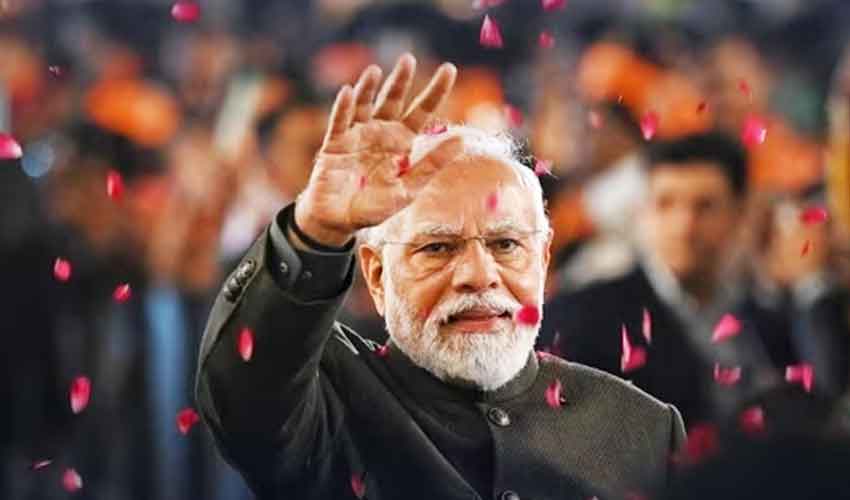Manual labourer Virender Singh, who makes a meagre living from odd jobs, claims that Indian Prime Minister Narendra Modi's efforts to elevate India are greater than his constant battles to make ends meet.
Even 10 years after he first stormed to power, Modi's popularity is still extremely high. He has effectively positioned himself as the guardian of India's growing prominence on the world stage as well as the interests of the country's majority religion.
Together, over two dozen opposition parties are running campaigns focused on addressing growing economic hardship in an effort to topple his Hindu-nationalist government in elections that begin next month.
However, their campaign has failed to connect with voters like Singh. Singh, who migrated to the capital from small villages to compete every morning for temporary jobs on construction sites, lives in a New Delhi slum with other migrants.
The 31-year-old told AFP, "There are many people in the country; not everyone will get jobs."
"No matter who is in power, the poor will remain poor," he continued. "I believe that since Modi is doing a good job, things should stay the same."
The 73-year-old Modi is riding high on a well-oiled campaign machine funded mostly by corporate contributions; a Pew survey from the previous year revealed that almost 80% of Indians thought well of him.
He oversaw the groundbreaking of a contentious temple in northern India in January, which was constructed on the site of a mosque that had been destroyed by radical Hindus many years before.
The opening of the Ram Mandir in Ayodhya was the most recent milestone in the rise of forceful Hindu-first politics in ostensibly secular India, which has caused religious minorities to fear for their future in the nation. At street celebrations across the nation, Hindus enthusiastically welcomed it, enhancing Modi's reputation as the leading defender of their religion.
According to Nilanjan Mukhopadhyay, who wrote a biography of the prime minister, "Modi has been able to convince his supporters that the hegemony of Hindus and the putting down of minorities is more important than things like jobs."
The opposition alliance fighting to topple Modi's government, known as INDIA, or the Indian National Developmental Inclusive Alliance, seems to have given up on this year's election before a single ballot has been cast.
Rahul Gandhi, the party's most well-known figure, has attempted to draw attention by organizing two foot marches across the nation to learn about the issues that regular voters face.
Gaurav Gogoi, a close aide to Gandhi, told AFP that the listening tour was effectively highlighting the "bread and butter issues" of the economic hardship that a large portion of the nation faces.
Yet Gandhi has already lost to Modi twice in brutal landslide victories, even though he is the son, grandson, and great-grandson of previous Indian prime ministers.
The 53-year-old has carefully avoided positioning himself as a potential prime minister this time around in order to prevent conflicts with allies who have their own ambitions to lead their country.
India's clamorous news channels, which many feel are largely beholden to Modi's agenda, have mostly disregarded Gandhi's campaigning.
During his current term, Modi has overseen the launch of new high-speed rail services, the G20 summit hosted by India, and the successful completion of an unmanned Moon mission.
After decades of poverty, the media gleefully depicted every incident as a symbol of India's growing power and prosperity.
According to Manisha Pande of Newslaundry, a news website that focuses on media criticism, "a large portion of the mainstream TV media today functions as a megaphone for the governing party," she told AFP.
Long-running public squabbling over which party will run for which seat has also severely damaged the opposition alliance's attempts to look like a different kind of government.
Rahul Verma of the Centre for Policy Research think tank in New Delhi told AFP that "people still find Modi more credible."
Opposition parties find it more difficult to coordinate. Each party is following distinct interests, even if they unite."
The Bharatiya Janata Party (BJP), which is in power under Modi, is accused by the opposition of attempting to sway the results of the election in its favour.
They claim that criminal investigations into a number of opposition party leaders are politically motivated.
According to data made public this month, Modi's party was by far the largest beneficiary of a contentious donation program his administration had set up.
Massive sums of corporate money could now be surreptitiously transferred to political parties thanks to the system.
A lawmaker named John Brittas told AFP that the opposition to Modi was structurally weaker.
He declared, "The BJP has made sure there are no fair playing fields."



























